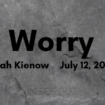A Christian’s Music
There may well be as many facets to this subject as there are possible chords on an 88-key baby grand piano. Since I’m the one with the blank computer screen and fingers poised over the keyboard, what you are reading is one Christian’s opinion about music. Take it for what it’s worth. If your pastor teaches something else, or if your own heart has convicted you a different way, please do not let these words alter your obedience to those things. In all things, follow Him. “To this you were called, because Christ suffered for you, leaving you an example, that you should follow in his steps” (I Peter 2:21, NIV).
The debate between church versus secular music goes back centuries. By the time it has gotten to us, we’re making uninformed decisions from the skewered perspective that what we know is all there is and nothing that was matters. In this twenty-first century all you have to do is Google “church versus secular music”—or some variation of that phrase—and you have opinions, blogspots, and still more opinions.
Let’s take a look at the Bible first. The Mosaic Law had six hundred thirteen rules. There were rules about dress and diet, moral codes, and all variations of life in their times. However, there is not one word—not one even slight mention—of anything pertinent to music. Musically, nothing was forbidden. They used their musical instruments and practiced the same styles and rhythms as anyone else. The thing that set their music apart was not found in what instruments they did or didn’t use, their styles or rhythms, syncopations or lack thereof. What set their music apart was that it was used for worship of the one true God and in celebration of the life He had given them to live. Scan the psalms and you’ll find songs of war and songs of peace, songs of love and songs of hope.
In Genesis 1:1, the first thing God tells us about Himself is that He is the Creator. Consequently, when you find yourself in the presence of true creativity, you find yourself in the presence of God. I am by no means suggesting that we include Rachmaninoff in Sunday’s worship set. Nor am I prepared to try to create a worship experience from a lyric that has a purely secular message. However, in your personal time of devotion, on occasion, you might create your own unique time of worship by celebrating the creativity of a dead composer. You might be driving down the road listening to a non-Christian station and find yourself suddenly in His presence when a lyric meaning something entirely different strikes a spiritual chord in your heart.
Did you know that at one time harmony was considered “sensual” by “the Church”—so only unison chants were considered sacred? Luther came along and broke down more barriers. “A Mighty Fortress Is Our God” was actually a pub song with a sacred lyric! One writer—speaking of that time—said, “Charles Wesley had the same mindset that Luther had. Make church music singable, hummable, simple and melodic—but with profound theological lyrics.” The lines between sacred and secular were blurring.
In his blog, Rev J (an unknown and unnamed writer), reported, “The seventies witnessed another shift as Contemporary Christian Music created a genre all its own that paralleled all the styles and sounds of the popular culture.” This is a lot of controversy once again. But as Larry Norman put it: “Why should the devil have all the good music?” At last the pseudo-boundaries of sacred versus secular music came tumbling down as artist after artist claimed their own unique voice. That genie will never go back into the bottle. It’s taken us this long to get back to what the Hebrews knew millenniums ago. “Whatever has breath, praise the Lord!” (See Psalm 150:6.)
Please do not misunderstand me. There is profane and ungodly music in our world today. There are lyrics that cannot be quoted in a Christian magazine that reflect lifestyles that are far from Christian. It may be rock-n-roll (light, hard, or in between), it may be rap, it may be country western. However, if you listen to it, it will affect your spirit. If you live on a steady diet of it, it will infect your spirit.
I saw an interesting video clip where a music pastor went to the streets and asked, “Can you name three songs that promote sexual purity?” There’s not one. In fact, one of the bolder responders explained, “In the mainstream … music is about sex.” Steven Tyler (Aerosmith) said, “Rock and roll is synonymous with a lot of things—sex being one of them. You can’t take that away … It just doesn’t work.” How do you think the phrase “sex, drugs, and rock-n-roll” got to be a cliché?
So, what about YOU and YOUR music? How do you choose what you listen to? Is it sacred? Is it secular? Is it both? Is it balanced? Can you really listen to whatever you want to?
There’s an interesting point to be made about the songs of the Bible. The first song is the last song. (Yes, you read that right.) Exodus 15 holds the first mention of the children of Israel’s singing. It is the song of Moses and the deliverance from Egypt’s bondage: “Then sang Moses and the children of Israel this song unto the LORD, and spake, saying, I will sing unto the LORD, for he hath triumphed gloriously: the horse and his rider hath he thrown into the sea. The LORD is my strength and song, and he is become my salvation: he is my God, and I will prepare him an habitation; my father’s God, and I will exalt him.” Then in Revelation 15:3 we hear it again as we read: “And they sing the song of Moses the servant of God, and the song of the Lamb, saying, Great and marvellous are thy works, Lord God Almighty; just and true are thy ways, thou King of saints.”I think it’s pretty amazing that in all the other details of the story, He took the time to reprise the opening theme as the closing credits are rolling!
I would be less than honest if I did not tell you that my iPod, the CD changer in my car, and the stations I have set on my XM radio are more than just the sacred songs of the Lord. No, you cannot listen to whatever you want to any more than you can eat whatever you want to (anybody got a food allergy?) or go wherever you want to (anybody tried to buy a round-trip ticket to Baghdad?). Whether you want to admit it or not, there are limits. Sometimes a mark of your maturity as a young person and as Christian will be your ability to set your own limits, and set them well. Life is about choices that need to be made carefully and prayerfully.
Here is what I chose as my criteria for music:
“Finally, brethren, whatsoever things are true, whatsoever things are honest, whatsoever things are just, whatsoever things are pure, whatsoever things are lovely, whatsoever things are of good report; if there be any virtue, and if there be any praise, think on these things” (Philippians 4:8).
Someone said that you are “marked” by the music that is popular when you are fourteen years of age, and it will be that style of music you respond to, are attracted to, and that brings you comfort throughout the rest of your life. Some things about music will always be a matter of personal taste and preference. Other things about music will always be clearly about the spirit in which they were created, the driving force behind their existence. So if the song can pass the test of true, honest, just, pure, lovely, good report … then keep listening!






